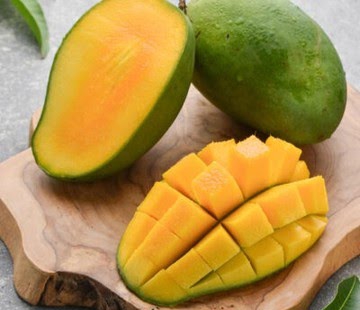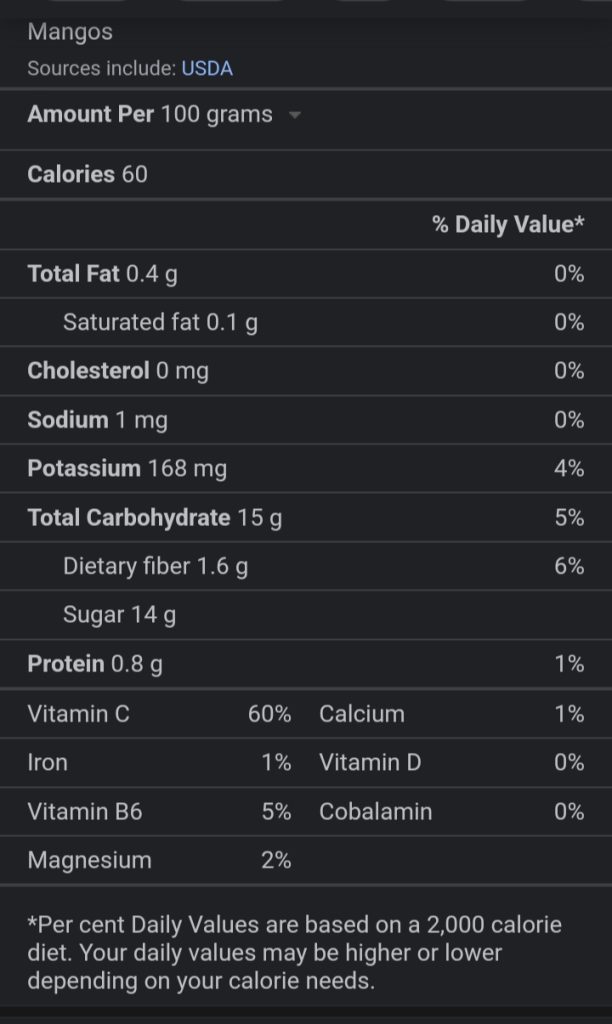MANGO: Why You Must Eat It This Season

– Top 5 health Benefits, Nutritional Value
As the season presents to us many exotic fruits and vegetables, it is important to understand what each gives in relation to their nutritional and health benefits.
NewsTrack Nigeria chooses to bring up the place of Mango among other fruits, even while it is called King of fruits. You deserve to know, especially at this age where so many things are on the table for consumption and yet end up making us sick.
We had to leverage on the effort of Nicola Shubrook, a registered nutritionist
This tropical fruit is refreshing and delicious, and like most plant foods has some great nutritional benefits, too. Registered Nutritionist, Nicola Shubrook, explains all in his piece ” Top Five Benefits of Mango”
Read below:
By Nicola Shubrook – Registered nutritionist
What is mango?
Mangoes (mangifera indica) are tropical stone fruits about the size of a grapefruit. The skin ranges in colour from yellow to green or red-green; the flesh is soft and yellow; and the fruit has an inedible, hard stone in the middle.
Mangoes are native to Southern Asia, but they are now grown in other countries including the US, Mexico and the Caribbean.
Nutritional profile of mango
An 80g serving of fresh mango provides:
- 48kcal/200kj
- 0.7g protein
- 0.3g fat
- 11.2g carbohydrate
- 1.3g fibre
- 134mg potassium
- 29mg vitamin C
An 80g serving of fresh mango counts as one of your five-a-day. When dried, just a 30g portion counts. Discover more about what constitutes one of your five-a-day with our handy infographic.

Top 5 health benefits of mango
1. Rich in protective antioxidants
Mangos are a good source of protective compounds with antioxidant properties, these plant chemicals include gallotannins and mangiferin. Both have been studied for their ability to counter the oxidative stress associated with day to day living and exposure to toxins.
As with other plant foods many of these compounds are found in and just beneath the skin. A 2012 study looking at the peel of mangoes concluded that it may play a role in preventing obesity, thanks to the plant chemicals located there.
2. May aid digestion
A pilot study in 2018 demonstrated that people with chronic constipation who ate mango over a 4-week period, enjoyed significant improvement in their symptoms, in part due to the fibre content but potentially from other compounds in the fruit, too. Interestingly, the leaves of the mango tree also appear to offer potential antidiarrheal activity thanks to plant chemicals in the leaves.
An earlier animal study found that obese mice who had a high-fat diet had improved gut microflora after mango was added to their diet. Studies suggest this may be thanks to the polyphenols, protective compounds like gallo-tannins in the fruit. The mango’s phytochemicals have also been studied for their gastroprotective effects, offering both anti-inflammatory and antioxidant properties to the digestive system, and may even help reduce inflammation in conditions like ulcerative colitis.
3. May help maintain healthy skin & hair
Mangoes contain reasonable levels of both vitamins A and C. Vitamin C is involved in the formation of collagen – the protein that acts as a scaffold to skin, keeping it plump and firm. Vitamin C is one of the most important antioxidants, playing a protective role against environmental damage; a deficiency of vitamin C can affect wound healing and increase fine lines and wrinkles. Our hair also requires vitamin C both for collagen production and also to help with the absorption of iron – an important mineral needed for hair growth.
All cells require vitamin A for growth, including the skin and hair – and some studies suggest that it may offer potential protective effects against the signs of ageing. One of vitamin A’s key roles is its involvement in the production of sebum, the oily substance that moisturises our skin and scalp
4. May support heart health
An animal study in 2016 suggested that mangiferin, offered heart protective benefits, including reduced inflammation. Further studies in animals suggest the same plant chemical may aid cholesterol balance.
While these animal studies are encouraging, human trials are lacking and more research needs to be done to assess whether these benefits are replicated in humans.
5. May support eye health
The orange flesh of the mango tells us they are rich in carotenoids which support eye health. In particular, they provide lutein and zeaxanthin two carotenoids that play an important role in the retina of the eye, protecting it from sunlight and from the blue light emitted from digital devices. Lutein and zeaxanthin are particularly useful in the fight against the signs of age-related macular degeneration.
Is mango safe for everyone?
Unless you experience an allergy, mango is generally recognised as safe for most people, when included as part of a varied, balanced diet. However, some sensitive people may experience contact dermatitis from touching the fruit.
Speak to your GP or healthcare provider if you’re concerned about an allergy.

- BBC Good Food (bbcgoodfood.com)/NewsTrack Nigeria (newstrack.com.ng)








